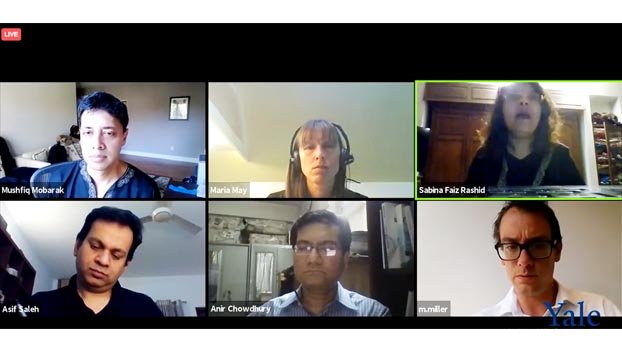Special $90m relief to support ‘new poor’ emerged from Covid-19

The government has planned a special relief of around 90 million USD to support ‘New Poor’ emerged from job losses due to Covid-19 crisis, speakers said on Thursday.
Expressing views in a webinar titled “Targeting Covid-19 Relief Payments in Bangladesh” they also said it is targeting people in need including the 12 million people who have left the Capital unable to afford the living cost due to job loss.
The webinar was jointly organized by Overseas Development Institute (ODI), Yale University MacMillan Center, Youth Policy Forum and Dhaka Tribune on Thursday.
The seminar was organized online to address some important issues regarding relief payment targeting in Bangladesh during Covid-19 crisis and provide answers to the frequently asked questions.
Anir Chowdhury, Policy Adviser of a2i, working on government’s Covid-19 response, participated in the event as a speaker. Mushfiq Mobarak, Professor of Economics, Yale University, Sabina Rashid, Dean and Professor, James P Grant School of Public Health and Asif Saleh, Executive Director, BRAC were also among the panelists.
Maria May, Senior Programme Officer, Financial Services for the Poor, Bill and Melinda Gates Foundation and Mark Miller, Director of Development and Public Finance Programme, ODI moderated the webinar.
The coronavirus pandemic has affected the livelihoods of the poorest citizens. The implementation of lockdowns and social distancing policies has rendered vulnerable groups depending on daily wages income-less.
Similarly, day laborers in Bangladesh are facing the same scenario and are in need of urgent monetary help. To help them survive, the Government of Bangladesh has pledged to assist 4 million vulnerable families with cash.
During the panel discussion, Policy Adviser of a2i Anir Chowdhury discussed the government initiatives under the existing Social Safety Net Program in Bangladesh (50 million people with over 2 billion USD, further extended by one million USD during Covid-19 crisis), along with the ministerial interventions for food support.
Regarding the ‘New Poor’ emerged from job losses due to Covid-19 crisis, he said, “The government has planned a special relief of around 90 million USD to support the new needy.
It is targeting people in need including the 12 million people who have left the Capital unable to afford the living cost due to job loss. But the targeting is not easy and we want to transfer the money before Eid this month.
So, we tried different technologies for targeting, a combination of QR Code, National ID card and traditional listing by local administration.”
He further expressed, “We’ve repurposed our national helpline 333, has been providing the citizens with information and services since 2018, for targeting the needy. So far we’ve received more than 400,000 calls and identified 100,000 after verification.”
He added that it’s basically a combination of low level technology for gathering information (phone calls from feature phones), high level technology for categorization (Telco data on phone usage) and human touch for verification. He also mentioned about the upcoming Crowd-funding initiative to engage the masses in helping the poor.
Executive Director of BRAC, Asif Saleh emphasized on community engagement, ownership and empowerment in the process acknowledging the need for a sophisticated system using technology during this wartime.
He said, “This is a crisis where a wide spectrum of different stakeholders need to come together, with their strength.” “Bangladesh has some fantastic examples of successfully managing crises, both long term and short term”, he added.
The panelists discussed the transfer mechanisms under the lockdown and social distancing rules to target the most disadvantaged and vulnerable population.
Professor of Economics of Yale University Mushfiq Mobarak underlined the necessity of a model using technology, empirical evidence from studies and human elements.
Dean and Professor of James P Grant School of Public Health Sabina Rashid highlighted the inclusion of the most vulnerable within the poor including women, Persons with Disabilities, transgender community and sex workers to prevent further marginalization.
The open for all webinar explored different concerns associated with targeting the relief payment including the tensions navigation between the speeds of response, equity concerns and the effectiveness of targeting; partnerships for targeting and gender inclusion during targeting.
The webinar recognized the power of mobile technology for both targeting and money transfer. It concluded with the prospect of further discussions and debates for an effective and inclusive model.



